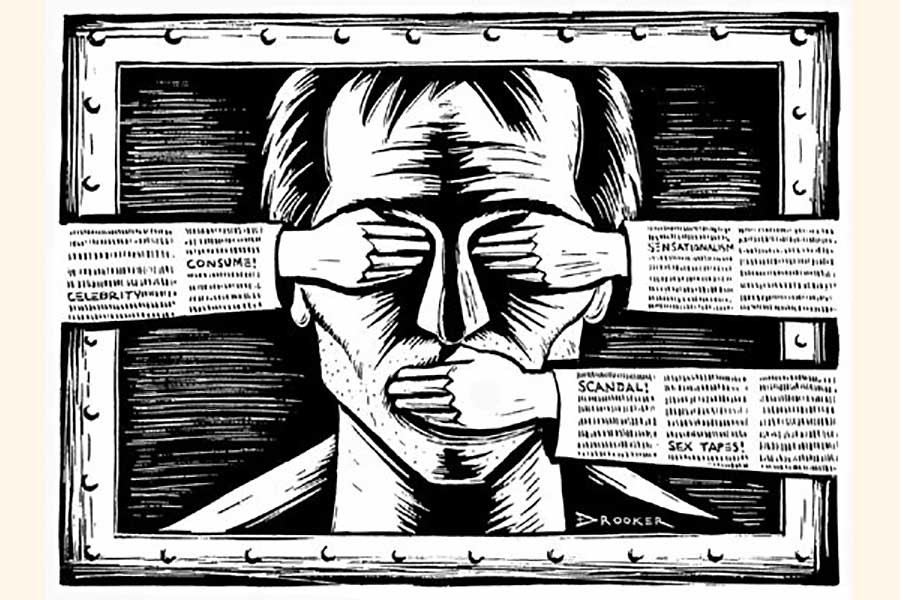The 2018 World Press Freedom Index prepared by the Reporters Without Borders and a Human Rights Watch report released marking the World Press Freedom Day are unanimous that hostility to media is on the rise the world over. Mediaphobia is not confined to dictatorial regimes and war-torn regions only, it is making its rounds in the democratic countries as well. Hatred towards journalists has thus posed a grave threat to the core value of democracy — freedom of expression. According to a US poll, more than 50 per cent of Republicans reckon the media as the "enemy of the people". US President Donald Trump heads the pack by openly expressing his loathing for the media. He paints reports he does not like as "fake news".
When the leader of the once free world and the land of the First Amendment which famously stipulates that "Congress shall make no law... abridging the freedom of speech, or of the press" takes such an abhorrent stand on press freedom, the gravity of the situation is easily understandable. The threat facing journalists is both psychological and physical. Although 2017 saw the lowest number of journalists killed -80 in total-across the world in a decade, it is by no means a cause for rejoicing.
A few days ago nine journalists covering a bombing were killed by a second suicide bombing in Afghanistan. In countries like Iraq, Syria, Sudan and Gaza areas in between Palestine and Israel, journalists covering war, bombing or shooting come under cross-fire, targeted attacks, bombing by rebel or terrorist groups and even government forces.
Yet physical annihilation of media people in war zones is not as grave a threat to free media as the various other intriguing methods governments in many parts of the world employ to muzzle those. Governments intimidate the media in an effort to keep those on a leash so that the former's tyrannical rule can be passed as democratic, failures and corruption can be veneered or hidden. If warning does not work, psychological pressure is created to compel the targeted media people to either fall in line or go for self-censorship. Even if such intimidations do not work, the ploy of physical threat is used or even carried out.
In a slightly better environment, the government does not have to go to such an extreme. The owners, usually business tycoons, do the job for the government because the two enjoy a social and economic rapport to their mutual benefit. One needs the other in order to consolidate their respective positions and privileges. Immediately after the sale of the Phnom Penh Post, Cambodia's last vanguard newspaper espousing human rights and liberty, to a Malaysian owner, Eidor-in-Chief Kay Kimsong was fired for refusing to retract a story on the impacts of the sale. In Myanmar, two reporters are imprisoned for investigating the Rohingya massacre.
However, Cambodia and Myanmar are not the epitome of democracy. In India, the world's largest democracy a newspaper editor Gauri Lankest was murdered in September last all because of her criticism of Hindu nationalism, cast system and discrimination against women. Asia and Africa not always considered champions of freedom of speech and media certainly have been witnessing a growing intolerance of the role they play. But European countries like Hungary, Czech Republic and Russia are also suffering from rising intolerance.
Some countries' ploy is direct, blatant and even cruel. Draconian laws are passed as if the Democle's sword is hanging on the heads of professionals of journalism. Countries still professing allegiance to socialism are mainly known for such practices. But increasingly non-socialist countries too are adopting this on the pretext of controlling cyber crimes. True social sites are responsible for circulating unverified rumours as news but this should have nothing to do with reports based on investigated facts that are used for exposing official corruption and intrigues. Then there are government sponsored media to counter facts, views and opinions through official propaganda.
Apart from forcing media censorship, press advice and advertisement restrictions, some take recourse to abduction, bodily harm or outright murder. The aim is to control the media and get things of the ruling cliché's choice published. In a situation like this truth suffers and objective reality reaches people in distorted forms. This does not serve a nation well.
Even in health matters or of socio-cultural affairs, the media brings issues of common interests into spotlight. Whether a playground for children is unsuitable for sports and games remains unknown unless the media report on them. Even the nutritional values of certain foods hitherto unknown but of late discovered by researchers are brought to the common people by the media. Many such things the printing and electronic media present in an objective and legible manner for easy comprehension of the public.
On the other hand, intolerant governments would take umbrage if the media report that distribution of midday meal in primary schools is not serving its purpose because of underlying lapses in the system. Yet if the administration is pro-people, it must appreciate the effort because the report has pointed out the system's defect and by bringing the matter to its notice given it an opportunity to correct it. A government is as much democratic as it is media-friendly.


